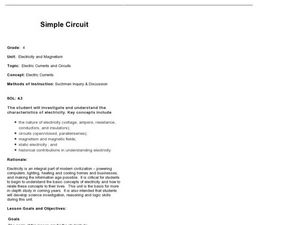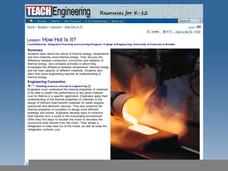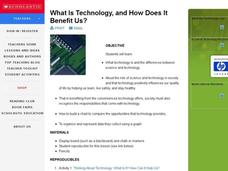Agriculture in the Classroom
A Rafter of Turkeys
How did that turkey get from the early Aztec culture to your table? Learn about the history of wild and domesticated turkeys in North America, as well as their inclusion in Thanksgiving traditions, with a two-part agricultural science...
Curated OER
Simple Circuit: Electric Currents and Circuits
Through inquiry and exploration, 4th graders will learn and understand the functions of open and closed circuits. They will break into 2 groups, define vocabulary, hypothesize how to light a bulb, then test their hypothesis 4 different...
Center for Learning in Action
Water—Changing States (Part 1)
Here is part one of a two-part lesson in which scholars investigate the changing states of water—liquid, solid, and gas. With grand conversation and up to three demonstrations, learners make predictions about what they think will happen...
Science Matters
That’s An Otter Story
Young scientists discover how sea otters' habitats have changed due to human impact. Through conversation, video observation, and story reading, scholars identify how human interactions change a specific ecosystem in both positive and...
Space Awareness
The Big Meltdown
Explore the world (our world) of melting ice caps. Why are these caps melting? What is the effect of melting ice caps? Dive into the ever-present issue of global warming with a resource that has learners looking at data and participating...
National Park Service
What Can We Do?
Motivate young conservationists to stand up and make a change. After learning about the efforts in Cascade Nation Park to reduce carbon emissions in order to preserve the wilderness, students work in groups creating action plans for...
Teach Engineering
How Hot is Hot?
Elementary schoolers identify the three methods of heat transfer: conduction, convection, and radiation. The lesson is mostly lecture-based. When the teacher has finished the presentation, groups of pupils get into teams and they must...
Scholastic
Minibeasts
Lead young scientists to discover insects outdoors. After investigating, students will record observations, learn about these fascinating creatures, craft, and role play.
University of Wisconsin
Infiltration Test: Exploring the Flow of Water Through Soils
Soil scientists gain experience with an infiltrometer can to determine the infiltration rates at different locations on campus. If you are using the entire unit, the class has already analyzed water flow and soil types, so they should...
Smarter Balanced
Zoos
How do the experiences of animals living in zoos differ from animals living in the wild? To prepare for a performance assessment on this question, class members are introduced to key concepts and vocabulary, and then groups use a Venn...
Channel Islands Film
Magic Isle: Lesson Plan 1
What are the factors that limit growth and expansion? As part of their study of Catalina Island, class members view the West of the West's documentary Magic Isle and research William Wrigley and the Santa Catalina Island Company. After...
Curated OER
Urban Ecosystems 4: Metabolism of Urban Ecosystems
Cities are compared to living, breathing, metabolizing organisms. Fourth in a five-part series of lessons, this one focuses on the flow of materials through a city. Links to interesting websites and images make your delivery of...
Science Matters
Island Fox Outreach
Off the coast of California lives a wild animal called the Island Fox. Experts discuss the importance of the Island Fox to the Channel Islands and the balance the fox creates within its ecosystem. The lesson concludes with a reading of...
Mary Pope Osborne, Classroom Adventures Program
Mummies in the Morning Egyptian pyramids, hieroglyphics
Visit the Magic Treehouse and take your class on a trip through time with a reading of the children's book Mummies in the Morning. Using the story to spark an investigation into Egyptian culture, this literature unit engages...
Curated OER
What Is Technology, and How Does It Benefit Us?
Students examine and define what technology is as well as the differences between science and technology. They assess the role of science and technology in society, conveniences technology offers and create a chart to compare the...
Education Development Center
Integer Combinations—Postage Stamps Problem (MS Version)
Number patterns can seem mysterious. Help your learners unravel these mysteries as they complete an intriguing task. Through examination, collaborative groups determine that they are able to produce all integers above a certain value by...
Lee & Low Books
Classroom Guide for Sacred Mountain: Everest
The most famous climbers of Mount Everest could never have made it to the summit without the assistance of the local Sherpa. Christine Taylor-Butler's nonfiction children's book Sacred Mountain: Everest is the focus of an extensive...
Alabama Learning Exchange
Systems Every "Body" Needs to Know
Through an informative WebQuest and group work, learners explore the human body and cell structure. They create a cell diagram, research a disease, write a letter explaining the causes of human disease, and work in small groups to create...
Gerald R. Ford Presidential Library & Museum
Benjamin Franklin: In Search of a Better World
Of the many roles he played, Benjamin Franklin most wanted to be remembered as B. Franklin, Printer. Learners of all ages find out more about this amazing man through the activities included in the Benjamin Franklin Tercentenary Guide.
Project Noah
Writing Goes Wild
Young scientists develop their observation and writing skills as they craft and then post a detailed description of a plant or animal they have spotted and photographed.
Curated OER
The Chesapeake Bay in Captain John Smith's Time
When Captain John Smith visited the Chesapeake Bay in the summer of 1608, what types of animals and habitats did he encounter? Your young historians will analyze primary source documents to answer this question, as well as compare the...
American Institute of Architects
Architecture: It's Elementary!—Fifth Grade
Young citizens construct an understanding of urban planning in this cross-curricular unit. Covering every aspect of city development from the political, economic, and social influences to sustainable building practices, this 10-lesson...
Houghton Mifflin Harcourt
That’s Amazing!: Challenge Activities (Theme 3)
Synonym dominoes, anyone? As part of the activities designed for kids who have mastered the basic concepts in the Houghton Mifflin Harcourt thematic unit That's Amazing! kids are offered a variety of activities that include developing a...
Out-of-School Time Resource Center
Nutrition and Physical Activity
Emerging nutritionists explore what it means to be healthy. In the beginning of the unit, your class will examine the five food groups and learn how food gets from the farm to our plates. This leads into the investigation of the...
Other popular searches
- Science Natural Disasters
- Science Natural Phenomena
- Science Natural Resources
- Science Natural Events
- Science Natural Cycles
- Natural Science Grade 9
- 4th Grade Natural Science
- Natural Science Powerpoint
- Natural Science Grade 3
- Science Materials Natural

























